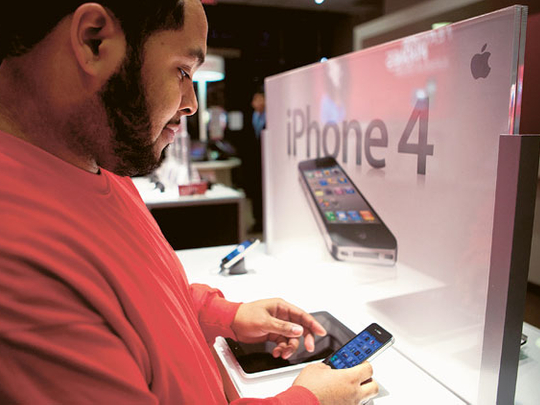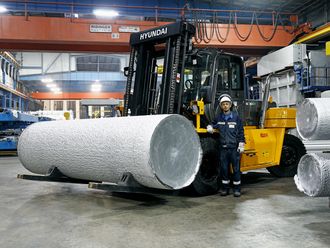
Dubai: A four-fold increase in demand by UAE owners of 11 million mobile phones for online data connectivity is pushing telecoms to adopt fourth-generation (4G) broadband services by year end.
While millions will need new 4G phones to enjoy higher mobile speeds of up to 150Mbps downstream, a 200 per cent increase in recent demand for mobile services makes super broadband imperative, operators say.
Etisalat said on Monday that it will spend millions to upgrade from its existing 3G technology as Du also prepares by year's end to do the same.
The UAE, etisalat said, is smack in the middle of a "broadband revolution that has accelerated exponentially … Over the last year, etisalat has witnessed a 200 per cent growth in data roaming traffic. Digital homes, smart buildings, intelligent household appliances and increasingly demanding customers are now driving the requirement for greater applications and connectivity than before."
In 2010, the UAE joined scores of other countries around the world engaged in trials of the more dominant Long Term Evolution (LTE) form of 4G to test the waters before a full launch of the super speed broadband system by the end of 2011.
The company said it "is now set to launch this future-generation, high-speed, low-latency mobile broadband service. The LTE (4G) technology is designed to increase the capacity and speed of its mobile network in order to provide customers with super speeds of up to 150Mbps downlink and 50Mbps uplink."
Etisalat noted that its existing 3G network already covers 99 per cent of the UAE's landscape but said unlike that network which is used more heavily for voice, 4G will usher the country into a future which demands higher capacity to push higher bit rates of video data while on the move.
Lifestyles
Recent reports state that young tech users in the UAE and Middle East are one of the highest users of online video services such as YouTube.
Jorg Erlemeier, head of Middle East Region, Nokia Siemens Networks, said in a statement yesterday that today's users in the UAE want a wider broadband service that can handle heavier data transmission loads.
"Lifestyles in today's world demand huge volumes of bandwidth as there is a desire to be connected anywhere and anytime. In the near future, operators need to ensure the best broadband experience and this can be achieved through investment, primarily in 3G and 4G. This is excellent news for mobile customers and the UAE in general," Erlemeier said.
Dominic Lowndes, managing director BroadGroup TMT Ventures, said upgrading to 4G will bring higher value to customers.
"Through a mix of advanced broadband technologies, etisalat has already embarked upon the process of deploying nation-wide networks and higher bandwidths that will add significant value to its customers' lifestyles. It will enable them to achieve much more anytime anywhere broadband."
Senior officials with etisalat and du couldn't be reached for comment by press time but in its quarterly earnings statement, du noted that it added 272,000 new mobile subscribers in the first quarter and mobile revenues doubled.
Osman Sultan, du's chief executive officer, said, "We are witnessing significant rates of growth in mobile data usage which represents an increasing proportion of our mobile revenues."
Global trend
It would appear by some accounts that UAE telecoms' approach to adopt new 4G network upgrades are in line with a global trend that favours the LTE technology.
Global mobile Suppliers Association (GSA) said in its latest addition to its Evolution to LTE report that 208 operators in 80 countries are now at some stage of adopting the new faster 4G broadband.
Alex Hadden, GSA president, said: "LTE made excellent progress in 2010 to become the fastest developing mobile system technology ever. We expect that the introduction of LTE systems and user devices will significantly quicken in 2011."
The report said 17 telecom operators have already launched their new 4G upgrade and that as of January of this year, there was a 140 per cent increase in one year in the number of operators investing in LTE deployments and trials such as those going in the UAE last year.
The biggest factor behind the massive adoption of the LTE network system, said the association's report, is that operators can simply upgrade from their existing 3G networks and not start from scratch.
"The uptake of LTE is a global phenomenon. All existing 3G technologies can harmonise to LTE."











